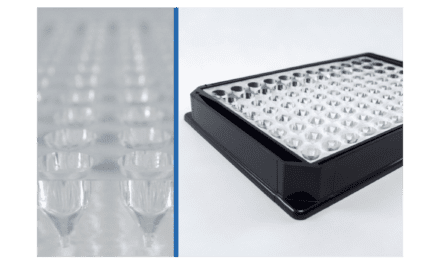Summary: Azenta Life Sciences’ two-component FrameStar microplate design improves qPCR results by minimizing thermal expansion and evaporation, leading to greater accuracy and reagent savings.
Takeaways:
- Improved Consistency: The two-component design of FrameStar microplates, combining polypropylene tubes with a polycarbonate frame, enhances qPCR consistency by reducing thermal expansion and evaporation.
- Reagent Savings: The reduced evaporation risk with FrameStar plates allows for the miniaturization of reaction volumes, leading to cost savings on expensive PCR reagents.
- Enhanced Reliability: The rigid polycarbonate frame of FrameStar plates maintains its shape during PCR, reducing distortion and ensuring better seal attachment, resulting in more reliable qPCR data.
Azenta Life Sciences announced a new study that shows how the two-component design of its FrameStar microplate range reduces thermal expansion and sample evaporation leading to improved consistency of PCR results.
Improved PCR Plates
Many commercially available PCR and qPCR plates are based on polypropylene designs because of their chemical inertness and that ultra-thin tube walls can be moulded enabling fast temperature transfer, says Azenta. While polypropylene is the standard material for PCR consumables, thermal expansion, and evaporation properties reduce its suitability for applications including qPCR and next generation sequencing. FrameStar PCR plates employ a novel two-component design consisting of polypropylene tubes in a polycarbonate frame.
Study on FrameStar PCR Plates
In a new study—the authors demonstrate how FrameStar PCR plates minimize the problem of evaporation-related qPCR inaccuracies due to their two-component design. The reduced risk of evaporation using these two-component plates facilitates the miniaturization of reaction volumes and therefore provides opportunities for savings relating to lower use of expensive PCR reagents.
Study data also demonstrated the benefits of using polycarbonate in the FrameStar PCR plate design. Using a more rigid plate frame that does not alter size or shape during PCR reduces distortion and weakens seal attachment to produce more reliable data for quantification.
FrameStar PCR plates are available in 96- and 384-well formats, with a choice of multiple well-frame color combinations. The 384-well plates are recommended for low volume PCR. The 96-well plates are available in low and standard (high profile) and come with a variety of skirt lengths (non, semi, and fully skirted).
Photo: Azenta Life Sciences





